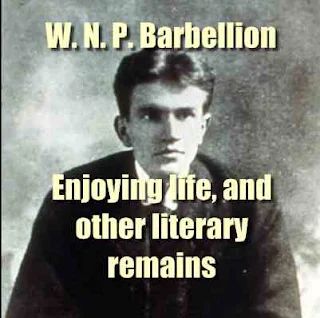Enjoying life, and other literary remains
The ungrudging tributes paid by most of its critics to Mr W. N. P. Barbellion's " Journal of a Disappointed Man," and the interest confessed by many readers in the personality of the author, with inquiries for more of his writings, if any might exist, encouraged his friends to release for publication some examples of the work of Barbellion as a naturalist and a man of letters.
" The Journal Essays " in this collection are from the original journal, which extends to over twenty post quarto volumes in the manuscript. It was at first intended that these essays should be included in the published journal, but they were omitted then in order to bring the first book within reasonable dimensions. The rest of this new volume is made up of contributions to various periodicals and of other essays now published for the first time
. They cover the period from 1905, when Barbellion was 16 years old, to 191 7, and they dispose finally of suggestions which have been made that the " Journal of a Disappointed Man" was not authentic but the work of Mr H. G. Wells, who wrote the generous introduction. Barbellion is of course a pseudonym, as Mr Wells himself pointed out in a letter to the Westminster Gazette, and, with the publication of these essays, it is open to anyone with sufficient curiosity to refer to the original sources and discover the real name, already known to Barbellion's friends. The final section contains so much of Barbellion's writings on natural history as may be of interest to the inexpert reader.
These are quite apart from his scientific memoirs, about thirty in number, that appeared in such journals as the Zoologist, the Annals and Magazine of 'Natural History and the Proceedings of the Zoological Society of London. Barbellion was not an academic student, and his attitude to those whose minds run along channels of dry formulae is suggestively set out in " The Scarabee Monographed."
He did not allow his interest in biology to dull the edge of his perpetual wonder and his sense of beauty. He was full, when occasion demanded it, of compact but unappealing forms of scientific description; but his deepest motive was his passion for knowledge of life. That gave humanity to his research, and in his writings transfigured science with beauty. " Bees, poppies, and swallows," he wrote, " and all they mean to him who knows " ; they meant more to him than to most men.
He went out among the birds and was too much taken with the beauty of the woods to do any nesting. He dissected a sea-urchin, and was much excited over his first view of Aristotle's "lantern " These complicated pieces of animal mechanism never smell of musty age after reasons of evolution." His imagination was fired, and there was, so to say, the flush of dawn over every glowing investigation. He interrogated nature with a fierce inquisitiveness which inflamed his approach to everything that came within the survey of his finely-tempered mind, and all were subjected to the "acid test" of intellectual integrity. That was his outstanding characteristic.
He never shirked a fact, ignored a consequence, or feared a conclusion. He faced them, one by one, squarely and boldly. He gripped life by the shoulders, his keen eyes steadily searched its enigmatic countenance, stare for stare, and he gazed profoundly into its depths. It exasperated him, enthralled him, baffled him. He saw its joys, its loveliness, its irony, its perplexities. He traced the comedy of it. He lived the tragedy of it.
He combined uncompromising exactness of inquiry with spiritual apprehension of the indefinable. For that reason he devoted himself to science humbly, almost with reverence; and he buckled on all his armour for the great task.
Contents: Journal essays.--Essays.--Two short stories.--Essays in natural history
Download Enjoying life, and other literary remains - PDF ebook 4.3 MB


